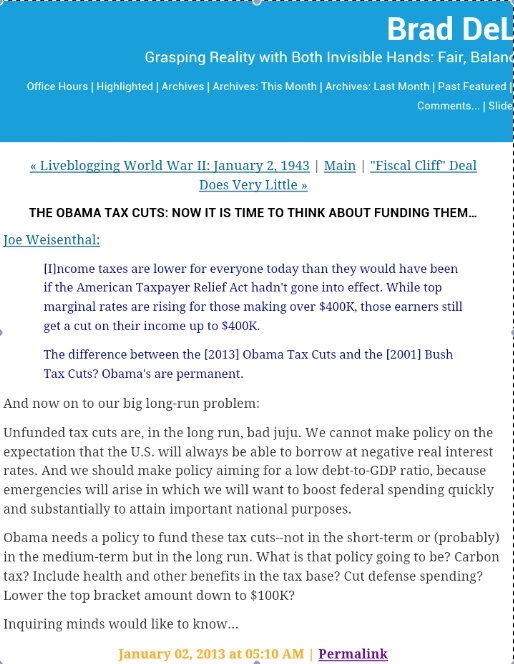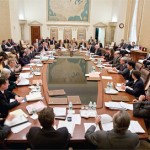 Brad DeLong is worried. And now I’m worried. He’s worried about “unfunded tax cuts,” which, he says, are “bad juju” in the long run. I don’t mean to pooh-pooh his juju, but what the heck is an “unfunded tax cut”?
Brad DeLong is worried. And now I’m worried. He’s worried about “unfunded tax cuts,” which, he says, are “bad juju” in the long run. I don’t mean to pooh-pooh his juju, but what the heck is an “unfunded tax cut”?
Here’s Brad’s post:
This kind of talk worries me a lot. It worries me because it perpetuates the myth that the U.S. government is essentially a giant household, constrained by the availability of cash-on-hand or the risk appetites of the money lenders, who could turn off the spigot a moment’s notice, hurtling us toward a Greek-style debt crisis. Not all of this is part of DeLong’s argument, but his fundamental point — that today’s tax cuts will have to be “paid for” with higher taxes or spending cuts in the future — suggests we’re living on borrowed time. It helps the deficit scolds, and it hurts progressives who lack a compelling counter narrative to defend against the deafening cry for “shared sacrifice”.
Tax cuts don’t “cost” the government in the way DeLong’s post implies. Tax cuts leave taxpayers with more money to spend, but they don’t compromise the government’s ability to spend later. Nor is the debt ratio a binding constraint, as Scott Fullwiler has been explaining in his series this week.
Can’t we just admit that the U.S. dollar comes from the U.S. government? That the i$$uer of the currency can never “run out” of money or be forced into bankruptcy. That the house on the left isn’t like the house on the right.
That the US government doesn’t need one of these in order to deal with future emergencies.
And that interest rates depend more on the policy decisions of the body on the left than the investment decisions of bond traders like the guy on the right.
Until people like us help awaken the population to the way modern money works, the deficit scolds will have the upper hand and the American people will suffer needlessly as Democrats and Republicans alike continue to hide behind the time-honored “how will we pay for it?”



















Pingback: Thursday Morning Reads: what the new law means for taxpayers « Writings on Wall St
Pingback: Stephanie Kelton-en kezkak | Heterodoxia, ekonomiaz haratago